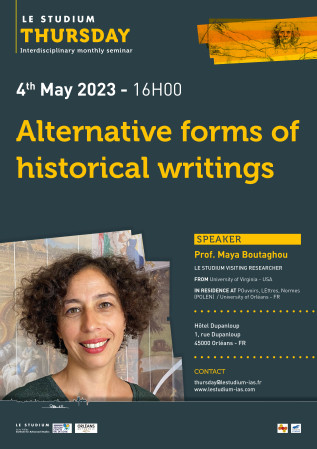Alternative forms of historical writings
LE STUDIUM
1 Rue Dupanloup
45000 Orléans
France
Presentation
One major aspect of my research in the four coming years will be dedicated to alternative forms of historical writings particularly in contexts with a problematic access to historical archives and to archival material in general. This current project addresses new ways of rewriting cultural history from a decolonial perspective without erasing previous narratives but trying to enlighten them and read them with decolonial lenses.
This became evident when the historians Benjamin Stora and Abdelmadjid Chikhi were appointed in the summer of 2020 to form a commission of delegates, respectively advising the French and Algerian governments on “reconciling memory” of colonialism and liberation. Despite the report delivered by Benjamin Stora in January 2021 to Emmanuel Macron, with several recommendations including implementing a commission of French and Algerian historians as well as to resolve the difficulty of accessing the archives in both France and Algeria, the impasse between the two nations over archives remains. This recognized difficulty in accessing historical sources makes every attempt to write critical and cultural history a circumvention of traditional historiographical methods. This attempt is simultaneously transgressive and creative through recourse to alternative forms that only a dialogue between historians and literary critics can unveil. Even while it is understood that history and literary critique can be associated, they remain distinguished by their relationship to evidence and chronological rigor. It is therefore important to capture them within the frameworks of chronology, dates, years and events that still seem to escape us, except when they appear amplified by the use of fiction, frequently before History could capture them methodologically.
How do we question forms of de-colonial historiography, from fictional writing and art in general, when we take into consideration the long colonial history? How does this new historiography offered through fiction function outside the contexts of institutional History? How then does this same fictional space allow us to question the historical markers imposed by colonial history? Supposedly neutral, the territory of artistic, and therefore fictional, creation unfolds in contacts between different eras in a reinvented relationship to chronology.
Speaker
LE STUDIUM Visiting Researcher
FROM: University of Virginia - USA
IN RESIDENCE AT: POuvoirs, LEttres, Normes (POLEN) / University of Orléans - FR





